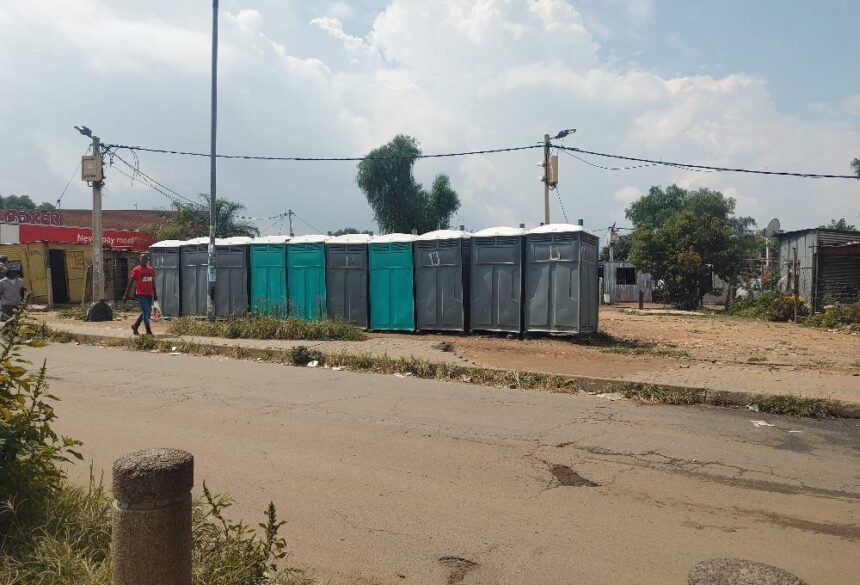Residents of Kliptown in Soweto have been enduring inhumane conditions for over two decades, living with plastic chemical non-flush toilets that have taken a toll on their health. The use of these toilets, which rely on chemicals like formaldehyde to break down waste and control odors, has caused some community members to fall ill.
Professor Martin Onani, head of the chemistry department at the University of the Western Cape, has warned of the potential health hazards associated with these toilets. He explains that exposure to toilet chemicals can lead to conditions like vaginal irritation, bacterial vaginosis, and urinary tract infections. The permeability of the skin and mucous membranes in the vaginal area makes it easy for these chemicals to be absorbed into the bloodstream, causing systemic effects.
One young woman in her early 20s, who grew up in Kliptown, shared her experience of getting an infection at the age of nine from using the chemical toilets. She recalled how her private area started itching and swelling, leading her to seek medical help. The clinic informed her that the chemicals had burned her private parts, prompting her to stop using the toilets and switch to using a bucket for her own safety.
The dire state of the toilets has forced many residents to resort to using buckets as an alternative, especially at night, due to health concerns. Eighty-three-year-old Julia Radebe expressed her frustration, stating, “We live in inhumane conditions. But the government doesn’t want to help us; they only come during voting season.”
Efforts to contact Kliptown ward councillors for comments on the state of the chemical toilets and plans to replace them have been unsuccessful. The toilets are drained twice a week, but the community continues to face health risks and safety concerns.
In August 2019, the South African Human Rights Commission (SAHRC) conducted a site inspection in Kliptown following residents’ complaints of human rights violations. During the inspection, it was revealed that grey water was running in trenches along streets and yards, posing a health hazard and drowning risk for children. The lack of a proper sewer reticulation system has forced residents to rely on insufficient chemical toilets and communal bucket toilets, further endangering their health.
The SAHRC requested the City of Johannesburg to provide direct responses and a copy of the Integrated Development Plan (IDP) for the Kliptown area, along with a report detailing the city’s progress and future plans for IDP implementation. However, attempts to get an update from the City of Johannesburg have been unsuccessful, leaving the residents of Kliptown in a state of uncertainty and continued hardship. The world of technology is constantly evolving, and it’s important for individuals to stay up-to-date on the latest trends and advancements. From artificial intelligence to virtual reality, there are countless innovations that are shaping the way we live and work. One of the most exciting developments in recent years is the rise of blockchain technology.
Blockchain technology is a decentralized, distributed ledger system that securely records transactions across a network of computers. Originally created as the underlying technology for cryptocurrencies like Bitcoin, blockchain has since been adopted across various industries for its ability to provide transparency, security, and efficiency.
One of the key features of blockchain technology is its ability to create a tamper-proof record of transactions. Each block in the blockchain contains a timestamp and a link to the previous block, creating a secure chain of information. This makes it nearly impossible for hackers to alter or manipulate data, providing a level of security that is unparalleled in traditional databases.
In addition to security, blockchain technology also offers increased transparency. Because each transaction is recorded on a public ledger that is accessible to all participants, there is a greater level of trust and accountability in the system. This transparency can help to reduce fraud and corruption, as well as streamline processes by eliminating the need for intermediaries.
Blockchain technology is being adopted across a wide range of industries, from finance and healthcare to supply chain management and voting systems. In the finance sector, blockchain is being used to streamline cross-border payments, reduce transaction costs, and improve the speed and security of transactions. In healthcare, blockchain is being used to securely store and share patient records, ensuring that sensitive information is protected and easily accessible when needed.
One of the most exciting applications of blockchain technology is in the realm of smart contracts. Smart contracts are self-executing contracts with the terms of the agreement directly written into code. These contracts automatically execute when certain conditions are met, eliminating the need for intermediaries and reducing the risk of fraud. Smart contracts have the potential to revolutionize industries like real estate, insurance, and supply chain management by streamlining processes and reducing costs.
As blockchain technology continues to evolve, it’s clear that its impact will be felt across a wide range of industries. From increasing security and transparency to improving efficiency and reducing costs, blockchain has the potential to revolutionize the way we do business. It’s important for individuals to stay informed about the latest advancements in blockchain technology in order to fully understand and capitalize on its potential benefits.








